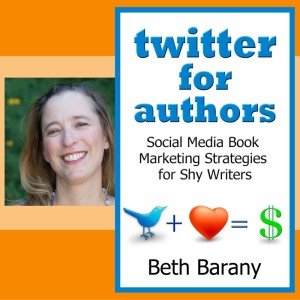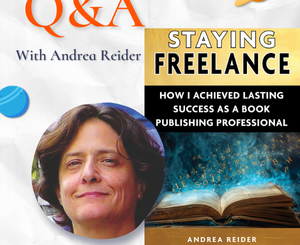Your Creative Work Needs Boundaries to Thrive by Beth Barany
 Today I want to talk about boundaries, so that you can get your writing (or editing or marketing) done in a way that works for you.
Today I want to talk about boundaries, so that you can get your writing (or editing or marketing) done in a way that works for you.
Another word for boundaries could be filters, rules, structures, or more literally a fence, door, window, or some other physical barrier separating you from everything else.
I have an intimate relationship with physical boundaries as I was in an incubator for the first two months of my life. I was born 2 and a half months early in 1968, weighing only 2 and a half pounds. As it’s been told to me, I had no body fat and looked like a little old lady. They kept me in an incubator until I got to a normal birth rate and then I was ready to go home.
So yeah, barriers, boundaries, come naturally to me. They’ve separated me from others, for survival reasons, both emotionally and physically.
That doesn’t mean I haven’t had to cultivate them to get to my writing. I so have.
Like you, I want to get my writing done, but it can be so overwhelming to open up email or social media or even turn on the news. It can also be distracting, heart breaking, or maddening. (Tip: Turn off ALL notifications for email and social media and schedule time to visit those things. This is what I do.)
We have family obligations, commitments, and bodies that need tending to. Yes, we can tend to our daily lives and still get writing done because of a few simple, but not easy, truths.
Everything — every activity, every creative project — has an inherent structure and a right timing.
This structure and timing is for you to decide and choose and act upon. It’s not designated from on high.
Here are some questions and reflections to help you sort out your structure and timing to help you get your writing done.
1. To get writing done, what’s the minimum amount of time you need to spend on your book and still feel like you’ve made progress?
Even though I like to work on my writing 1-3 hours at a time (4-6 days a week), I’ve discovered that when I’m starting or restarting after a break of even a day off, I can manage at least 20 minutes of work. This is a small enough yet satisfying enough chunk to get a nugget of writing (or brainstorming or editing) done.
To focus, and remind myself not to check Twitter, I set a timer and guide myself into the writing by saying that I only have to work for 20 minutes. Only 20 minutes.
If I want to work more, I do, because I’ve already scheduled that 1-3-hour slot. (Yes, scheduling on the calendar is one of my secret tools to making time for what’s important to me.)
Now that you know what is your minimum satisfying writing time, here are more boundary questions to consider.
2. To actually get to your writing, what do you need to stop doing? What can you say No to?
Since I’m self-employed helping writers, one of my challenges to getting to my writing was that I was filling up my day with activities and appointments. By the end of the day, I’d feel frustrated and like a fraud because I hadn’t put time into my novel.
I finally realized I was addicted to being busy. I was moderately good at the day-to-day tasks of running a business. It felt like I was doing something, anything, to advance my business. That work was so much easier than facing the unknown of my story.
When I let go of the busy-ness so I could have the space and time to write, I was surprised to see that my business didn’t suffer and I got more writing down. So satisfying.
Often our creative work requires sacrifice.
Do you need to give up TV watching or other activities that drain you?
Not all that you could stop doing is outside of you. Some of what you need to release or experience differently is your self-doubt, or perfectionism, of harsh inner critic.
We all experience those voices, but we don’t have to make them the boss of us.
You are the sovereign of your creative world. You are also the sovereign of your actions, including what inner chatter channel you listen to.
Also, what would it be like to drop the things that are easy but safe? (That was my case.)
Some writers I know need to drop poor self-care. They don’t take breaks even to eat or stretch while they write, thus they deprive themselves of the space and freedom and peace they so desire.
What if writing was part of your self-care, part of the luxury or freedom or peace you seek?
Making necessary changes may be a big risk; it may lead to uncertainty. But it may also lead you to the benefits your writing gives you.
Which leads me to my next question for you.
3. What is the benefit of putting time into your writing?
I always come back to this question. It’s hard to do something so difficult as write a novel without knowing why you’re spending all this time.
Another way of stating the question is “Why do I want to put this book (or series) out into the world?” And, what motivates you to write and publish your book?
Dig deep and uncover this for yourself. It will be personal. The reasons may make no sense to anyone else. That doesn’t matter. What matters is that you know why you do this creative hard work.
Post this in your writing space, or make a collage of your WHY.
4. Lastly, to get writing done regularly, figure out your prime time for creating.
I figured this out after lots and trial and error (and by taking this test here, a Peak Performance Quiz) and now I’m so clear that my prime time for writing and editing is about noon to 3pm, give or take.
I can write and edit before and after those times, but I’m not super happy about it.
So, if you’re beating yourself up because you’re trying to write first thing in the morning…or late at night and that’s not your preferred time, you are making things way more difficult that they need to be.
You’re doing yourself a tremendous disservice if you’re not writing when you want to. You’re essentially shooing the muse away. And then you wonder why she doesn’t show up when you finally sit down to write.
I know life happens and we can’t always write during our preferred times. But studies on peak performance show that if we cultivate the habit of writing at the same time regularly we’re strengthening those muscles and can then use them to write sometimes during our “off-hours.”
In summary
To create strong boundaries so you can get to your writing (and editing and marketing), here are the questions to answer:
1. To get writing done, what’s the minimum amount of time you need to spend on your book and still feel like you’ve made progress?
2. To actually get to your writing, what do you need to stop doing? What can you say No to? Do you need to give up TV watching or other activities that drain you? Also, what would it be like to drop the things that are easy but safe? What if writing was part of your self-care, part of the luxury or freedom or peace you seek?
3. What is the benefit of putting time into your writing? Another way of stating the question is “Why do I want to put this book (or series) out into the world?” And, what motivates you to write and publish your book?
4. Lastly, to get writing done regularly, figure out your prime time for creating.
I’d love to hear what resonates for you, what you discover for yourself and your boundaries, and what your next steps are. Comment in the blog to share with your fellow writers and me.
You’re invited to our Plan Your Novel Party & Giveaway!
Saturday, Sept. 23rd, 2017, 10am to 6pm Pacific
WHY COME TO OUR FREE EVENT
You’ll be able to brainstorm your novel step-by-step—from character development to plot structure to story themes and world building—by the end of the party, you’ll have everything you need to start writing your story.
This PLAN YOUR NOVEL party is useful for you if you have never written a novel, have always wanted to, and still feel lost on how to go from brilliant idea to The End, or if you always hit that sagging middle and lose focus or lose interest.
The PARTY FAVORS will help you dream up exciting ways to torture, I mean challenge, your characters all the way to the resolution of the story.
Q: Where does this event take place?
A: In a private Facebook group! You’ll get the link when you sign up.
SIGN UP AND YOU’LL GET
An All-Access Pass to “7 Keys to Story Planning” course
- The companion ebook “7 Essential Keys to Planning Your Novel”
- A Party Checklist to help you create a fun day with your friends, plus some surprise party favors!
- An invitation to the live virtual event on Facebook where you’ll to get ask questions to the experienced instructors of the “Plan Your Novel” course
- A ticket for the Grand Prize Giveaway! Grand Prize is a ticket into the “Plan Your Novel” Oct. 2017 live course ($99 value). Other prizes will be offered too! Lots of chances to win Party Packs!
Sign up here: https://writersfunzone.com/blog/pynparty2017/
You can also share by clicking to tweet: https://ctt.ec/P1Yy9
ABOUT BETH BARANY
 Beth Barany is creativity coach for writers, a teacher, workshop facilitator, and speaker, helping writers address overwhelm and confusion so that they can write, market, and publish their fiction. And make it fun!
Beth Barany is creativity coach for writers, a teacher, workshop facilitator, and speaker, helping writers address overwhelm and confusion so that they can write, market, and publish their fiction. And make it fun!
Owner of the Barany School of Fiction, an online training hub, Beth takes great interest in how humans learn, create, and grow, and includes all her students’ life experiences, including the ancestors, into the moment. Check out the comprehensive Plan Your Novel course here.
She also writes magical tales of romance and adventure to empower women and girls to jump into life with both feet and be the heroes in their own lives. Check out her Henrietta The Dragon Slayer series here (YA Fantasy) and her magical and romantic Touchstone series here (Fantasy/Paranormal Romance).
Support her mission to empower women and girls with her fiction on Patreon here.
Read her latest book for writers, Twitter for Authors, here.







Keeping this Post close by. Very Helpful! Great reminders of what needs to be done in order to accomplish what we desire to do. I especially like the concept of integrating writing into a person’s ‘self-care plan’. Great idea! I also enjoyed taking the ‘Peak Performance Quiz’. I found it interesting how my peak times have transitioned with me, adapting to life’s circumstances.
Beth, this is a beautifully intimate and sobering blog post about being mindful of what goes on around us and what we allow to sap strength and time from us. I’m also grateful for the insight to think about my peak performance hours.
I took the quiz you mention and it says my peak performance is late morning, and I must admit that’s when I get the best ideas at work. Alas, I can’t spend the time writing then but perhaps that’s when I should do my weekend writing.
When I write, I set a timer for myself to ensure that it’s a distraction free period. If I feel the urge to “check” things like Facebook or Twitter, I just look at the timer and tell myself that I can do it, but only after the timer is expired. Then I set another timer for 15 minutes to limit how deeply I get sucked into cyberspace. I also use this timer to remind me to get up and move. Sitting for too long is unhealthy.
Beth, thank you for this post that is timely for me. I took the quiz and found out my peak performance hours are late morning, which validated what I suspected. I don’t “gear up” until I’ve been out of bed a couple of hours. I’m retired and work on my writing from home, and I was frustrated with trying to be productive when I first woke up. Now, I can plan what to do with that time that doesn’t require the focus needed for writing, like watching training videos and webinars, revising my plans for the day, or conducting research.
Mary, I’m so glad that you’re keeping this Post close by. Glad it was so helpful.
Hugh, thank you! Late morning, my fav too. Great idea to use it for the weekends. Love those timers too!
Billie, you’re so welcome. Late morning, awesome! Glad this awareness can help you re-arrange your day and let go of the frustration. Let us know how it goes.